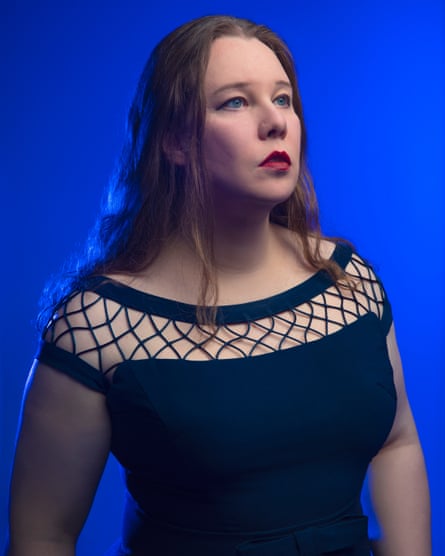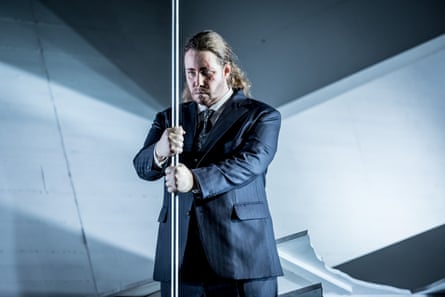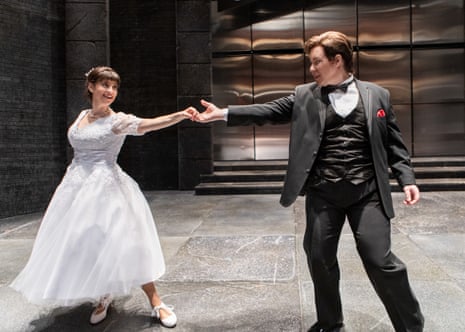A production of Don Giovanni opening this weekend in Tulsa, Oklahoma, stars a transgender woman in the title role.
While operas around trans themes are starting to emerge, Tulsa’s take on Mozart’s classic represents the first time a professional opera company in the United States has hired a trans person to sing the lead in a standard work.
Lucia Lucas, the woman charged with playing one of the opera canon’s best-known protagonists, is a rising star. The 38-year-old singer has performed on major stages in Europe and Asia. Next season, she will make her debut with the English National Opera in Offenbach’s Orpheus in the Underworld. And all this using the dramatic baritone voice with which she launched her international career, before she transitioned, a decade ago.
“I think I can retrain my voice to contralto, mezzo or soprano. But how long would that take and what’s the likelihood I would get hired?” says Lucas, who was born and raised in Sacramento, California, and calls Karlsruhe, Germany, home. “Whereas I have work in the standard baritone repertoire into 2022. Why would I mess with that?”
Trans singers are just barely starting to make inroads on professional classical music stages. In the US, the Spoleto Festival in Charleston, South Carolina, engaged a trans male singer, Adrian Angelico, for the Italian composer Luca Francesconi’s experimental work Quartett in 2017, and a trans female singer, Breanna Sinclairé, has performed arias with the San Francisco and Colorado symphonies but has yet to make her professional opera debut.

“This is not affirmative action,” the Tulsa Opera artistic director, Tobias Picker, says of his choice for the role. “Lucia has a very powerful and penetrating voice and a dramatic intensity. That is what I was looking for in casting Don Giovanni.”
When Lucas started transitioning in 2014, she was well along the way to establishing her career as a hot young baritone in Europe. “I had this fine career going, and then I came out,” says Lucas, who has chronicled her transition process on her blog, including a post celebrating her “6-month Vaginiversary” in 2016. “The question was: what happens to my career after I come out?”
Lucas earned spots in some of the most prestigious young artist programs in the United States, at the Santa Fe Opera and Chicago Opera Theater, among others. She was 29 when she made the jump to Europe in 2009. Her wife, a fellow opera singer whom she met when they were both students in California, followed two years later.
Lucas says they moved to Germany for employment. “There is just much more work here,” Lucas says, citing her adopted country’s multitude of opera houses and opportunities for year-round, salaried employment.
She had been working steadily as a staff baritone in opera houses in Germany and Italy, landing prominent roles in operas like Figaro in The Marriage of Figaro and Edward Teller in John Adams’ Dr Atomic, by the time she decided to transition.
After decades of questioning her gender, she remembers that night in 2013 with clarity.
“I was in South Korea doing a Wagner opera,” Lucas says. “I was talking to my wife on Skype. We were both keeping weird hours because of the time difference. So it was this weird sort of fever dream state. We talked about more and more stuff, things that in our normal routine of life we wouldn’t be talking about. She said, ‘You know, maybe it’s time to ask somebody about this?’ And then when I came back from Korea, I started asking doctors how this works.”
Opera has long featured non-traditional presentations of gender. For hundreds of years, female singers have been playing young men and boys on stage in so-called “trouser roles”, from Hansel in Humperdinck’s Hansel and Gretel to Octavian in Strauss’s Der Rosenkavalier. And then there is the once popular, now defunct tradition of male castrati gushing out florid Handel arias in the upper echelons of the human vocal range.
Yet Lucas says she has encountered prejudice since coming out. “I have had opera administrators say to me, ‘It’s not that we don’t like you. But our public, what would they think?’”
She says attitudes towards trans people have become more open over the past five years, since trans characters have started proliferating in movies and on TV. It’s no accident that she only felt ready to make her transition in 2014. “If I would have come out before my audition for Germany in 2009, they probably wouldn’t have taken me,” she says. “Things have changed a lot since then.”

Tulsa Opera’s Don Giovanni is an expression of that change. “The potential doors that this is now opening for trans singers is a very exciting step forward,” says Matthew Shilvock, the director general of the San Francisco Opera. He says trans singers have not yet come forward to audition for roles at his organization, one of the largest in the US. “But if the voice is right for the role and right for the house, I would gladly hire that person.”
Lucas would like to see more opportunities for trans singers to play standard roles, as opposed to what she calls appearing solely in “specialty projects” featuring trans or non-gender-specific characters (though she welcomes those opportunities, too).
One of the best experiences of her career so far, Lucas says, was playing Wotan in Die Walküre last autumn in Magdeburg, Germany. She feels a particular affinity for Wagner, and she loved playing the Norse God in a straightforward way.
“There was no extra story about being trans, or a female baritone, or anything like that. It was simply the story done as it is always done, in traditional masculine dress.”
